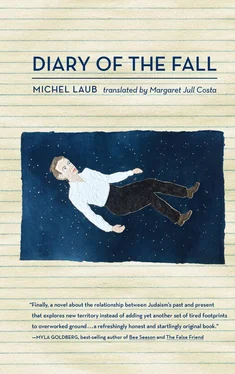37.
I don’t know if I did it simply because I was mirroring my classmates’ behavior, João being thrown into the air once, twice, with me supporting him right up until the thirteenth time and then, as he was going up, withdrawing my arms and taking a step back and seeing João hover in the air and then begin the fall, or was it the other way round: what if, deep down, because of that plot hatched in the previous days, because of something I might have said or an attitude I might have taken, even if only once and in the presence of only one other person, quite independently of the circumstances and any possible excuses, what if, deep down, they were also mirroring my behavior?
38.
Because of course I used the same words, the words that led up to the moment when the back of his neck struck the floor, and it didn’t take long for me to notice my classmates beating a hasty retreat, just ten steps to the corridor and the porter’s lodge and the street and suddenly you’re tearing round the corner without a backward glance and not even thinking that if you had only reached out an arm to break the fall João would have got up, and I would never have had to see in him the consequence of everything I had done up until then, school, break-time, the stairs and the playground and the wall where João used to sit, the sandwich flung across the playground and João buried in sand and me allowing myself to be carried along with the others, repeating the same words, the same rhythm, all of us together at the same time, the song you sing because that’s all you can do when you’re thirteen: eat sand, eat sand, son-of-a-bitch goy .
A FEW THINGS I KNOW ABOUT MY FATHER
1.
The first entry in my grandfather’s notebooks is about the day he disembarked in Brazil. I’ve read dozens of accounts written by immigrants, and new arrivals tend to remark upon the heat, the humidity, the uniforms worn by the immigration staff, the army of petty con men who gather at the port, the skin color of someone sleeping on a pile of sawdust, but my grandfather’s first sentence is about a glass of milk.
2.
It seems that my grandfather wanted to write a kind of encyclopedia, an accumulation of apparently unrelated words, each followed by a short or long text, and each with its own peculiar characteristic. The entry for milk , for example, speaks of a liquid food with a creamy texture, which as well as containing calcium and other substances essential to the organism has the advantage of not being highly susceptible to the development of bacteria .
3.
My grandfather then moves on to port, luggage and Sesefredo , and it isn’t hard to see that the words occur in the order in which he came across each of those places, objects, people and situations. You can follow the sequence as if it were a story, but because the entries are so obviously contrived and written in such a crassly optimistic tone, the effect is quite the opposite: my grandfather writes that there is no record of any illnesses being caused by drinking milk, that the port is the meeting place for street vendors whose work is subject to strict fiscal and hygienic controls , and it isn’t hard to imagine him there on the quay, having eaten the last slices of the dry bread that was his only food on the voyage, and drinking his first glass of milk in years, the milk of the new world and the new life, poured from a jug kept who knows where or how or for how long, and because of which he would almost die.
4.
The Jewish immigrants who arrived in the south of Brazil — initially in the port of Santos, then traveling from there to Rio Grande and finally in a small steamship to Porto Alegre — usually stayed in the homes of relatives or distant acquaintances or in small guesthouses in the center. The name of the guesthouse where my grandfather stayed was Sesefredo. In the notebooks, he defines it as a clean spacious establishment, quiet in the mornings and cozy and welcoming when night falls . A place where someone with typhoid fever, probably contracted from drinking a contaminated glass of milk, is cared for by the generous owners who speak German and explain in German the nature of the illness, its symptoms and the 25 percent mortality rate, and this in an age when the necessary antibiotics had not yet been invented or had not yet reached Brazil or not at least that particular guesthouse. In the Sesefredo Guesthouse it was possible to withstand those four weeks of vomiting, headache, malaise and a forty-degree fever thanks to the kindness of its owners , the couple who never threaten their new guest or spend those four weeks saying that they will kick him out into the street as soon as his last centavo has gone.
5.
Unlike my grandmother, my father spoke little about the banal details of my grandfather’s life. Perhaps because he died when my father was fourteen, and so what would be the point of wondering if my grandfather used to arrive promptly at work, if he was nice to the customers, if he treated his employees well, if he enjoyed what he did for ten or twelve hours a day until he retired and spent what remained of his life at home, shut up in his study, and if during all that time he made any comment about the house where they lived, the city or the country, about something he had seen or experienced, something that would remove from him the label that was always present in any conversation I had with my father on the subject: the man who survived Nazism, the war, Auschwitz.
6.
My father spoke a great deal about the Germany of the 1930s, about how easily the Jews were deceived, and how easy it was to believe that a raid on a house was an isolated event, that the appearance one morning of a Star of David daubed on the door of an optician’s or a hardware store was the work of a group of vandals, because if you own a business and pay your taxes and create employment and feel comfortably at home in the country where three generations of your family have lived, you’re not going to want to believe in the possibility that you might lose everything, and from one day to the next have to board a ship, with only the clothes on your back, heading for some place about whose customs, politics or history you know nothing.
7.
In my grandfather’s notebooks, the Brazil of 1945 was a country that had never experienced slavery. Where no immigration officers placed restrictions on the arrival of immigrants fleeing the war. A land full of opportunities for a teacher of mathematics who spoke no Portuguese, and so as soon as he had recovered from typhoid, my grandfather began looking for work, which would not be hard given the huge demand in the schools, universities and institutes that made of Porto Alegre a place of scientific excellence, where there were regular symposia on art and philosophy, pleasant events followed by pleasant evenings spent in one of the innumerable cafés in the center frequented, naturally enough, by pretty single women , whose parents would be delighted to be introduced to a Jew.
8.
Imagine a wealthy house in Porto Alegre in 1945. Imagine a dinner party at such a house, the table at one end of the dining room, a family speaking various languages, even or especially German. The family is served by uniformed staff and they pass comment perhaps on the swearing-in of the new President Eurico Gaspar Dutra, who my grandfather has never heard of, or a speech by Carlos Lacerda, who my grandfather has never heard of either, just as he has never heard of any of the other familiar references of the period, the casinos, Rádio Nacional, the showgirls in the cabarets, and, as the evening wears on, people drink and offer toasts and at no point does the owner of the house address my grandfather except to remark that the world would be a worse place now that the Americans had won the war.
Читать дальше












